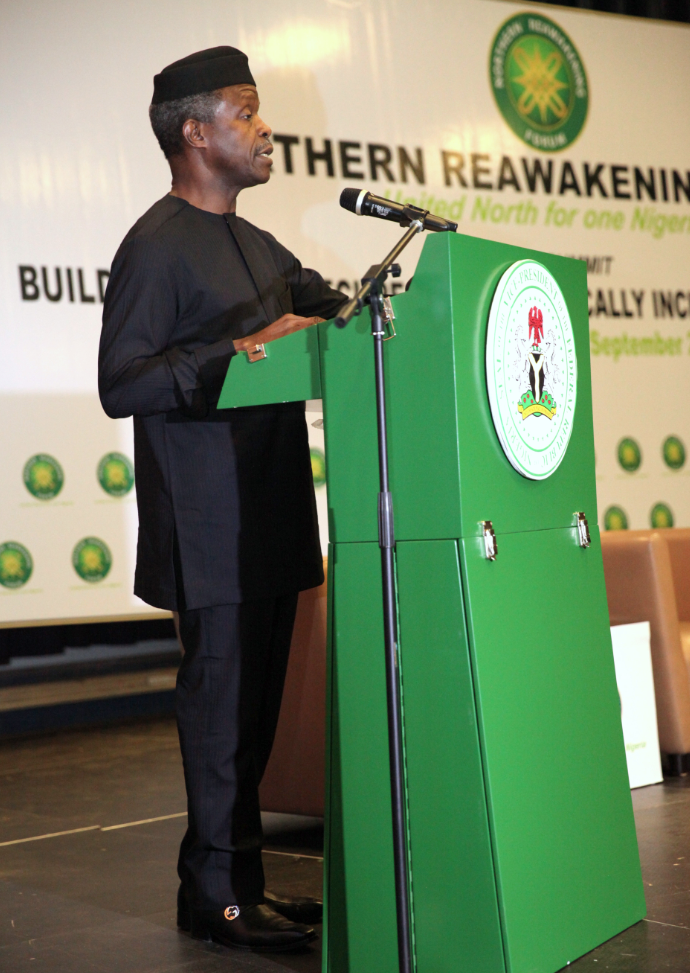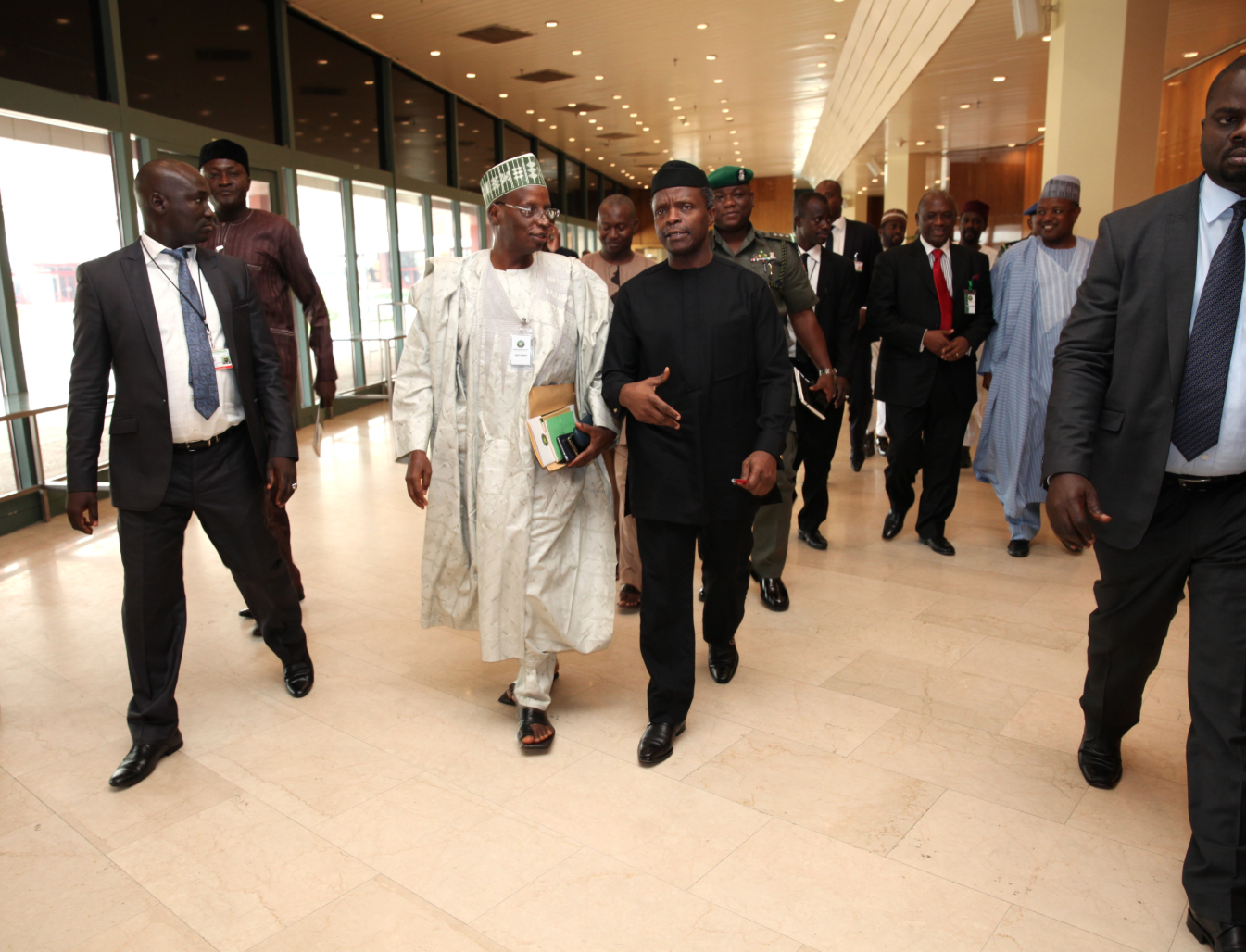Northern Re-awakening Forum Summit
OPENING ADDRESS BY PROF. YEMI OSINBAJO, SAN, GCON, THE VICE PRESIDENT, FEDERAL REPUBLIC OF NIGERIA AT THE NORTHERN RE–AWAKENING FORUM SUMMIT, ON 12TH OF SEPTEMBER, 2015.
I am greatly honoured to have been invited to share this historic day with you. I must confess to being thoroughly fascinated by the purpose of our gathering here today. Some of the most pivotal moments in history began like this.
The very idea that a few men and women decided to change the course of their society, will always meet with skepticism. Many will say how can so few change the orientation and conditions of so many? How will ten men and women change 70 million? But the truth is that this is the story of every great change in history, it starts with very few committed people even sometimes one man. This is the power of a selfless, altruistic idea, propagated by men and women who recognize their place in history and in their generation. The end of an unacceptable situation is determined by the tolerance of those that it affects. The day they demand for a change and revolution begins.
This is partly why I am so excited about today, and the great journey of change that the Northern Reawakening Forum has begun. But the more important reason for my excitement about today is that there is in this effort an independent recognition of a wider idea, an idea that our Nation itself needs change, an idea that became a movement whose symbol was and remains Muhammadu Buhari, now President of Nigeria.
A nation of 170 million people, the sixth largest producer of oil, over a hundred varieties of solid minerals and precious metals, hundreds of thousands of hectares of arable land, the largest economy in Africa, yet desperately poor, over 110 million extremely poor. Maternal mortality exceeding over 55,000 women a year, top three in the rates of infant mortality, 10.4 million children out of school, a nation where despite huge human and material resources a tiny minority has over the years stolen and or squandered the common wealth.
So the Northern Reawakening Forum or the movement for Northern Renaissance is a crucial component of a nationwide demand for change. A nationwide consensus that the Nigerian people deserve better. And this call coming for the North is particularly imperative, this is because parts of the North experience some of the worst consequences of poverty. The challenges we face as a nation are the same, the difference is not of a kind but of degrees. In the Nineteen Northern States of Nigeria, Human Development Indices are by far poorer than the rest of the country, the problems are of a higher degree.
The Northern States occupying about 70% of the land mass of the country, have the highest infant and maternal mortality rate, the lowest rate of child enrollment in schools, highest number of unemployed young people, and of course face the challenge of inter-ethnic and inter-religious conflict, including the Boko Haram terrorism.
The National Bureau of Statistics 2015 figures show that of the poorest 10 States in Nigeria are in the North and with the exception of Ebonyi state, possibly even the poorest 12. The Northern Nigerian Economic Summit in Abuja in 2012 was one of the first fora to draw attention to some of the depressing statistics. Samsudeen Usman, then Minister of Finance showed that the Northern States had the worst literacy statistics in the country and speaking at the Moghalu Foundation Lecture in 2013 HRH the Emir of Kano, then CBN governor said that 93% of girls in the North are denied access to education and 73% of women between 20 and 29 are unable to read. Dismal as some of these conditions and statistics might be, it certainly does not have to define our future or that of our children. We can point to the past to draw some inspiration from the lives of some of those who gave all, to ensure that the vast majority of our people do not remain in want or poverty.
History reminds us of the visionary leaders in Nigeria, who fired our imagination through their vision, diligence and selfless service. Sir Ahmadu Bello, Sardauna of Sokoto, Sir Abubakar Tafawa Balewa, Mallam Aminu Kano, J. S. Tarka, and countless others who clearly understood the varied issues afflicting the region, thought thoroughly through them, laid out plans and worked selflessly to realize them. What you should note is that they did not live or fight to enrich themselves, they lived to enrich the lives of the people. They did not leave vast personal estates behind, but their names and legacies live in the hearts of the people.
Today a new generation attempts to pick up the mantle where the great builders left it years ago, I am convinced that we have the will to think thoroughly through our challenges with clarity and sincerity of purpose, if we do, the glory of the latter days will surely be greater than the former.
I have looked through the programme of today’s event and I am heartened by how it does not shy away from the tough issues. From girl child education to the Alma-Jiri system, from women empowerment to the economic viability of states, from an immediate Marshall Plan-like attempt at addressing the areas in conflict to how to create cooperation between states and stakeholders. This is as it should be, we must ask ourselves the tough questions, and be humble enough to accept responsibility for our own errors or wrongdoings so that we can repair damage, make bold workable plans and move on to the great future that lies ahead.
The Federal Government is committed to action on all issues that affect the life of Nigerians in any part of the country. We have been active in interventions in the North East, due to the immediacy of the crisis in that particular axis of our nation.
But the problems of illiteracy, disease and poverty are exacerbated by the Boko Haram insurgency in the North East. A close detailed analysis and plans for the North East has been drawn up in collaboration with the affected states and some development organizations. We have been working and streamlining, in particular government interventions, through the Presidential Initiative on the North East, Victims Support Group, and several other initiatives. Now all of the Federal Government initiatives are now under the chairmanship of General TY Danjuma. We hope that streamlining these efforts in this way will help to ensure immediate delivery of succor to many of the problems that currently afflict the North East.
We are aware though that interventions are not institutions and neither should they be. Within our plan, is a short term strategy for immediate alleviation of hardship as well as a long term plan to build infrastructure, which most closely affects the economic lives of the most vulnerable citizens of our nation.
We will make the interventions work but more importantly we want to build institutions that live on and make more of an impact in the years to come and beyond. We cannot end poverty without addressing economic policy. Those economic policies that we articulate, Do those policies address the core needs of the vast majority of the poor? Is there an honest attempt to ensure that we create opportunities for the extremely poor amongst us, using our common wealth? Or are we, as elites who dictate the narrative and fashion the rhetoric, so self-consumed that we think that Nigeria and its resources are meant only for us?
Our preliminary answer to these questions are the reasons why the Federal Government under President Buhari believe that creating social safety nets for the poorest must be the beginning of addressing the concerns of the list amongst us. Conditional Cash Transfer, School Meal Programs, Universal Health Care Insurance and other social protection programs are critical to the way that we intent to address the concerns of the poor.
All too often in our contemporary circumstances the relationship of the Nigerian State and its citizens have often been at loggerheads. The majority of our people have no commitment to the national enterprise, they are alienated from the State because they simply cannot see what their benefit from the State is.
Clearly the time has come to take a Bottom-Up approach in our economic planning. We must plan, budget and draw up policies that show that we realize that over two thirds of our people are desperately poor. Governments must understand their roles, not as an end in themselves but as institutions formed primarily for the welfare of the majority of the people. We believe that this is the Change that Nigerians are yearning for in this season in the nation’s history.
Let me conclude by commending the Northern Reawakening Forum for convening such a timely event. It is important that we sit and talk but it is more important that we follow through on the issues that are raised here. I am told that to ensure that the outcomes of this event are quickly harvested, the forum has a follow up retreat. This is a commendable strategy, I look forward to receiving the concrete plans and steps to implementation at your earliest convenience.
With the coming into office of President Buhari, the Nigerian elite has one more opportunity to redeem itself. For too long, the millions of Nigerians have been no more than statistics for the political business and professional elite to manipulate as they see fit. Rather than face up to the real issues affecting the lives and livelihoods of our people, we have diverted attention by playing ethnic and religious cards, telling the people that the important thing is which tribe or religion rules. But gradually the people are unraveling the fraud, the faces of hunger in Borno, the death of the young in Ibadan or Abakaliki, demonstrate that people everywhere are the same. Neither disease nor hunger is interested in your ethnicity or religion. The poorest are our responsibility. The wealth of the nation belongs to all. We must affirm their dignity and use public resources to create real opportunities capable of lifting millions out of the tragic consequences of poverty.
This is the Nigeria of our dreams, this is the spirit and purpose that must be reawakened.
Thank you.



